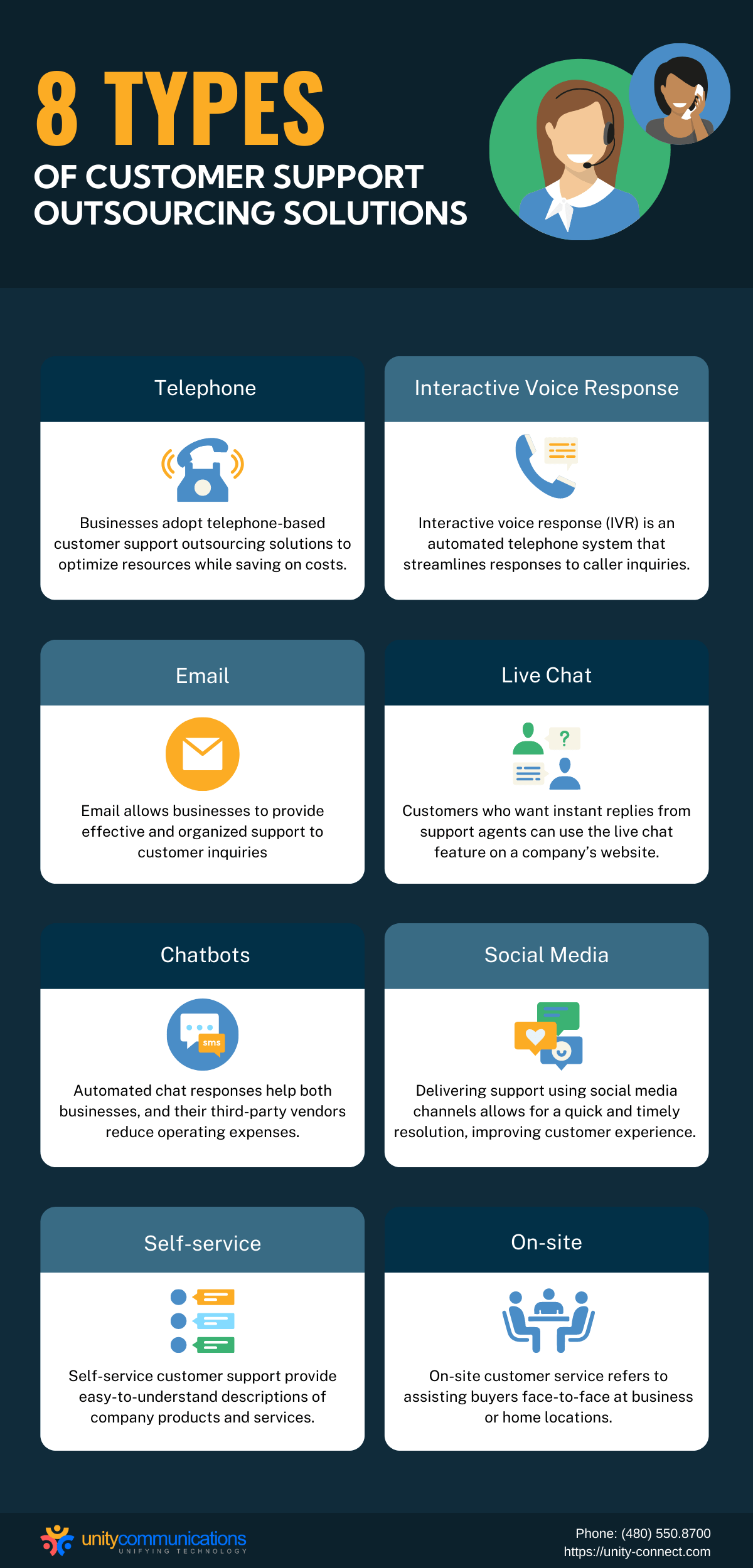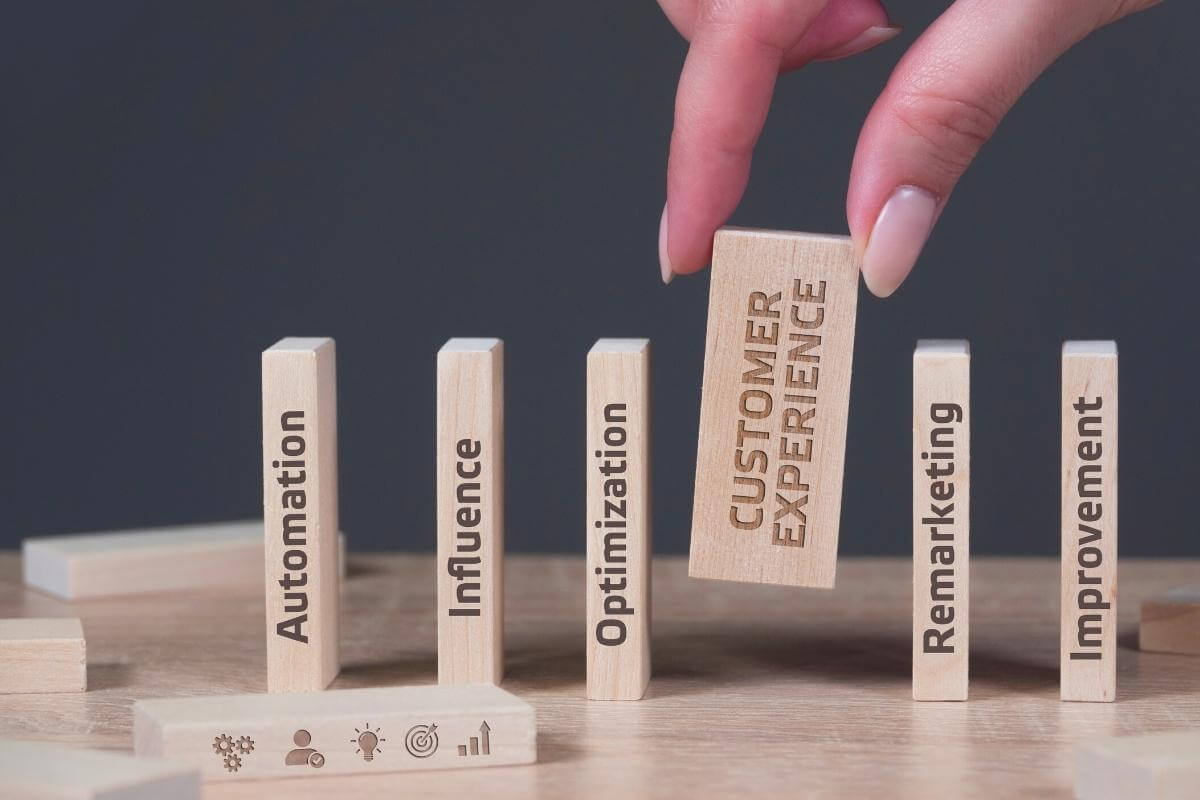Table of Contents
Small, mid-sized, and large enterprises strive to deliver a superb customer experience. At the same time, they develop and pursue growth-driven initiatives. But the high overhead of setting up an in-house customer service team can hinder companies from achieving their goals. Recruitment, technology acquisition, and workplace setup for customer service require a great deal of time and funding.
E-commerce customer service outsourcing offers a cost-effective approach for enterprises. Third-party providers ensure quick and thorough responses to consumer inquiries, enabling companies to prioritize their core functions with no degradation of customer experience.
This article discusses different customer support outsourcing solutions. Explore them to learn whether these solutions can effectively address your needs.
What Is Customer Support Outsourcing?

Customer support outsourcing is hiring third-party service providers to focus on customer inquiries, such as questions on product features or complaints about defects. Contractors perform these customer-facing tasks using voice and non-voice communication platforms.
Outsourcing customer support enables you to reduce operating expenses. Vendors employ the best talent and use advanced technologies to address consumer concerns fast and effectively. You no longer need to spend extra dollars on forming an in-house team; you just pay the monthly billing stated in your contract.
This approach also helps increase business revenue by allowing you to focus on enhancing your core products and services. Providers prioritize and deliver a superb customer experience to maintain their good market reputation. You can expect that they will build and expand a loyal consumer base for your enterprise.
But working with a third-party service provider is not a one-size-fits-all business strategy. It offers different customer support outsourcing solutions to match your needs. Weigh your outsourcing necessities by understanding these various categories.
Onshore vs. Offshore
Consider the business location when you’re seeking the right customer service provider. You can choose onshore outsourcing to avoid the hassle of different time zones and cultural barriers. This outsourcing type means the provider operates in your home country.
If you target a more diverse, global market, select offshore outsourcing. Offshore third-party contractors can help you reach a broader coverage area because of their multilingual agents. They can also provide 24/7 customer support because they adapt to varying time zones.
Both types allow you to save on operating costs. Whether based in the U.S. or elsewhere, contractors provide customer support experts and modern systems at reasonable prices. They let you pay for their services only when you need them or as indicated in a long-term agreement.
Multichannel vs. Omnichannel
Understanding the difference between multichannel and omnichannel customer service helps you pick the best vendor for your business needs. Both strategies consist of multiple platforms to engage with customers. But the core of each approach highlights their differences and purposes.
Companies taking the multichannel approach use various communication platforms individually. Call centers, social media management, email support, and live chat – each is a separate customer service function. So each medium has dedicated agents to deliver efficient customer support.
An omnichannel strategy puts customers at the center. Businesses implement this approach to integrate and personalize their customer service. A single team handles this communication model to provide a seamless, unified customer experience.
An omnichannel service provider offers more affordability by using an integrated communication channel to address customer inquiries fast and around the clock. You pay your outsourcing partner a fixed service charge to accommodate buyers’ varied communication preferences.
An omnichannel service provider also helps drive profitability by delivering a personalized customer experience. According to Zendesk, 90% of 3,500 surveyed consumers will spend more with companies that personalize customer service. Expect an increase in your loyal customer base and in revenue when working with an omnichannel customer service contractor.
Shared vs. Dedicated
As you look for customer support outsourcing solutions, review whether you want a shared or dedicated approach to meet your operational needs. When selecting the right customer support model, consider your budget, inquiry volume, and scalability.
The shared customer service framework enables businesses to access third-party resources shared with other companies, depending on their seasonal needs. In contrast, vendors implementing the dedicated customer support model provide resources solely for a single company’s benefits.
The shared framework is your most cost-efficient option if you only need third-party customer support during peak season. But when you want to outsource your customer support fully, adopt the dedicated model to receive more specialized service at reasonable costs.
Inbound vs. Outbound
Determine whether you want to procure customer support outsourcing solutions for your inbound and outbound processes. You must understand their differences to align an outsourcing investment with your operational budget.
Inbound customer service is when customers contact support agents to relay product or service concerns. Customers can submit or follow up on their inquiries via phone calls, emails, live chats, and other communication platforms.
In an outbound process, your customer service agents contact the buyers to send promotional materials, new offers, or problem resolutions. Agents use the same communication channels to disseminate such information.
You can outsource the two non-core processes individually based on your needs. For instance, you can delegate your outbound support function to a third-party provider if your in-house marketing team no longer helps expand your customer base.
Your service provider can also handle both customer support functions per your request. Outsourcing these repetitive tasks enables you to improve your core capabilities by freeing up time and money, enabling you to bring enhanced products and services to your customers and their evolving needs.
Call Center vs. Contact Center
One of the essential tips for outsourcing customer service is to know which hubs—call centers or contact centers—you should pick to achieve cost efficiency and consumer satisfaction. Ensure that your chosen provider will also help you deliver a superb customer experience and attain continued growth.
Call centers are the traditional method of delivering customer service. They handle inbound and outbound inquiries over the phone. Businesses can outsource these hubs if they focus on accommodating telephone-oriented customers.
Contact centers, however, present a more holistic approach to customer service. Whether multichannel or omnichannel, contact centers provide voice and non-voice customer support. So if you have a digitally immersed consumer base, outsourcing to a contact center is an excellent choice to ramp up your customer support.
Take note of the differences between call and contact centers to decide which would be best for your operational needs and budget.
Eight Types of Customer Support Outsourcing Solutions

As digital communications boom, many companies strive to provide customer support on multiple channels. They aim to establish an environment where customers feel comfortable relaying concerns about their purchases. Once set up, that environment can create a customer comfort zone that results in greater customer satisfaction and retention.
But creating this safe space for customer engagement can cost you extra money. Consider learning about business process outsourcing (BPO) to differentiate related customer services better. This can help you match your outsourced customer support investment with your budget.
To ensure enterprise growth, know how your service provider delivers an outstanding customer experience. Familiarize yourself with the following customer support outsourcing solutions for better strategic alignment.
1. Telephone
A telephone is a classic communication channel used to deliver customer service. Customers can contact call center agents to ask questions or raise issues about a purchase. The voice approach helps older generations receive an unmatched customer experience.
Third-party call centers have agents skilled in oral communication and fluent in English and other required languages. They also use advanced systems to automate call management. Businesses adopt telephone-based customer support outsourcing solutions to optimize resources while saving on costs.
2. Interactive Voice Response
Interactive voice response (IVR) is an automated telephone system that streamlines responses to caller inquiries. IVR integrates text-to-speech technology with a dual-tone multifrequency interface to automate resolutions for simple issues.
Companies can implement IVR support instead of hiring many call center agents. In addition to cost reduction, the IVR system helps improve call flows and reduces wait time. This can result in greater customer satisfaction.
3. Email
Email is one of the first digital innovations in customer service. Customers can send a detailed message about product concerns to a designated email address on company websites. If your consumers prefer comprehensive assistance and don’t need help immediately, email support is a great choice.
Outsourcing email support helps businesses provide swift, organized responses to customer inquiries. BPO providers use ticketing systems to handle all queries. Email support outsourcing increases consumer confidence and brand loyalty.
4. Live Chat
Customers who want instant replies from support agents can use the live chat feature on a company’s website. Live chat support is increasingly sought-after customer service because of its quick and direct response capability compared to phone support. This non-voice solution allows both consumers and agents to multitask during the wait time.
To increase sales and accommodate massive customer requests simultaneously, companies delegate their live chat support to third-party providers. BPO providers have well-trained agents and modern software solutions for real-time customer-centric support.
5. Chatbots
Chatbots handle basic customer service requests and problem resolutions. These platforms use artificial intelligence (AI) to automate responses to common issues. Although they basically remove the human connection, chatbots can also help customers connect to the right agents to address complex problems effectively.
Automated chat responses help both businesses, and their third-party vendors reduce operating expenses. Agents are no longer needed to perform simple Q-and-A tasks, enabling companies to reduce recruitment, onboarding, and training costs.
6. Social Media
Billions of people worldwide use social media to connect and share content. Companies also use social media as a powerful channel to reach their target markets. They use the platform to provide accelerated customer service and to monitor current trends.
But monitoring social media consumes time and effort, potentially hindering businesses from prioritizing their core functions. Relying on third-party service providers’ expertise to manage this labor-intensive customer support frees up funds and time to pursue sales and product innovation.
7. Self-service
According to Emplifi, 39% of polled American consumers rank self-serve customer care options as highly important. The software company states that speed, availability, and convenience drive consumers’ desire to use self-service options.
Self-service customer support consists of frequently asked questions (FAQs), video tutorials, infographics, and other promotional materials published on corporate websites. They provide easy-to-understand descriptions of company products and services. This approach works well for customers who usually perform their product research.
Businesses assign the development of these materials to their in-house digital marketing team. They can also hire contractors or freelancers to perform this task at a reasonable cost.
8. On-site
On-site customer service refers to assisting buyers face-to-face at business or home locations. Technology companies typically offer this customer support type. They provide in-person repairs and troubleshooting services for complicated tech issues.
Businesses rarely outsource on-site support because their in-house teams have deep knowledge of how to fix products when issues arise. But they delegate their voice and non-voice customer support to third-party service providers to reduce labor costs.
Benefits of Customer Support Outsourcing Solutions

Knowing the different types of customer service platforms allows you to decide which solutions suit your needs best. You can also assess whether it’s more cost-effective to outsource them separately or together. Similar to outsourced data entry services, these customer service solutions offer various benefits for businesses of all sizes.
For Small Businesses
Small businesses must search for ways to reduce operating costs while focusing on their continued growth. Small enterprises outsource their customer service to save on costs.
BPO providers charge only for their productive time through a fixed or variable service agreement. They also bring a skilled workforce and advanced systems to help small businesses increase their productivity and profitability.
For Mid-sized Enterprises
Outsourcing allows mid-sized enterprises to scale up their customer service team during peak season quickly. This business strategy helps them be more flexible in meeting customer demands during hectic holidays, helping them save on labor costs while keeping their in-house customer service teams for off-seasons.
For Large Companies
Big corporations significantly reduce overhead when they outsource their customer service departments entirely. They eliminate significant funds in salaries, infrastructure, and other resources expended on in-house service. A third-party vendor provides all these operational needs at a reasonable cost.
For instance, large enterprises can reduce expenses on organizing their supplies when acquiring inventory management outsourcing. They can reinvest the funding for this non-core task in improving their products and primary capabilities.
The Bottom Line
Regardless of enterprise size, companies strive to provide exceptional customer service for their buyers. However, high labor and infrastructure costs can impede their efforts to deliver a superior customer experience.
Adopting customer support outsourcing solutions helps businesses achieve customer service targets while generating savings. Understanding the differences between BPO strategies and platforms also ensures companies can reap benefits from outsourcing customer support.
If you want to take advantage of customer support outsourcing, hire Unity Communications today. The award-winning company helps you succeed by complementing your customer service strengths. It embraces automation and employs a talented workforce to streamline your voice and non-voice customer support operations.




